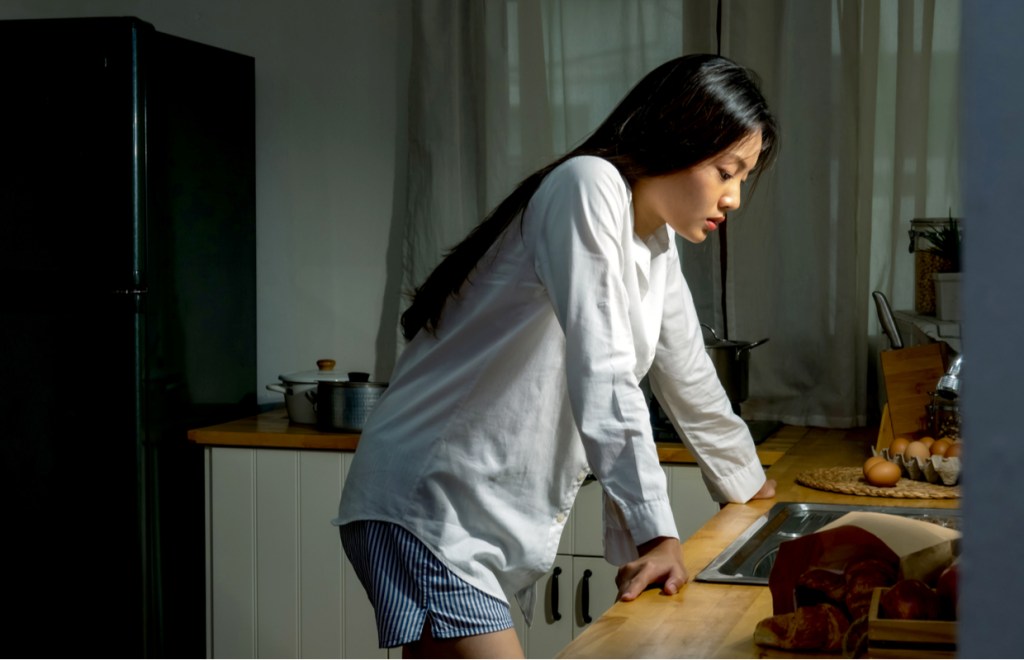How to overcome social anxiety
Are you feeling social anxiety symptoms after lockdown? Discover how to overcome a fear of social situations and re-emerge wiser and more empowered...

Over the past few years, many of us have become used to not socialising. When it became the norm to not meet up with friends or leave the house, suddenly being thrown back into the world of socialising has caused a wave of social anxiety – even in the most outgoing and extroverted people. So, what can we all do to regain our social confidence? Let’s take a closer look at how to deal with your fears so you can overcome social anxiety…
With lockdown restrictions now a thing of the past, our previously abandoned social calendars are suddenly filling up. For many of us, that initial invite sparks a flicker of excitement: the opportunity to get out and spend time with friends can feel elating, especially after so long apart.
However, while the excitement may still be present, plenty of people are finding that it’s tainted with an overwhelming sense of dread – perhaps about the logistics of getting to the social event, the scheduled duration of the meet-up, or your contributions – or lack thereof – to the conversations. If you’re experiencing any of these thoughts or feelings, you may be struggling with some post-lockdown social anxiety.

What is social anxiety?
Social anxiety existed long before the Covid-19 pandemic. Commonly defined as an overwhelming fear of social situations, social anxiety can look different on everyone. It has a range of different signs and symptoms, many of which often stem from a deep-rooted fear of judgement or humiliation.
Whether you already experienced social anxiety prior to the pandemic, or you were previously the most confident person in the room, it is clear that the ‘stay at home’ rules have had a significant effect on the social confidence of many people. But why are we suddenly finding socialising so much more difficult, when it was part of our lives for years before the first lockdown hit?
‘The thing about socialising as we come out of lockdown restrictions is that we’re simply not used to it, no matter how many years we spent doing it before,’ says Sophie Mort, psychologist and author of A Manual For Being Human (Simon & Schuster, £14.99).
‘All that time not chatting to others and navigating the social world has made some of us feel rusty and unsure of the normal way of responding to people. We feel anxiety, excitement and uncertainty about a world we don’t really know how to be part of any more.’
Learning to reintegrate
It’s not just people who live alone or have been shielding who are experiencing these worries. ‘We’ve been hearing from families who have struggled without the framework of frantically busy weekend schedules for the children,’ says Amy Perrin, Founder of the loneliness charity Marmalade Trust.
Family units, siloed during lockdown, are having to learn to reintegrate with the world again too. And, while we may be eager to get back to some semblance of normality, it’s worth considering that our collective psyches may not have caught up with that desire.
How the pandemic activated our ‘threat brain’
‘Whether we are aware of it or not, the pandemic has activated a part of our emotional system that is alert to, and responds to, threat,’ explains Nelisha Wickremasinghe, psychologist and author of Being With Others (Triarchy Press, £14.99).
‘During lockdown, we’ve been exposed to threats in the form of job insecurity, physical ill health, relationship loss and social isolation. Our “threat brain” deals with this by activating a fight, flee or freeze response.’
The impact of this on our ability to resume our old social lives will vary among individuals. ‘Some people will react to this sense of social threat with the fight response and may feel unusually aggressive and irritable around others,’ says Wickremasinghe.
‘Some will feel they don’t want to mix with others because they still represent a threat (flight), and some will be desperate to reconnect and find relief through being with others by, for example, excessively organising social events for others – and this is the freeze response – where we put our own needs on ice by people pleasing.’

How to overcome social anxiety
A pressing issue right now is recalibrating our sense of self. For many of us, social confidence is derived from the stories and anecdotes we share with others. But, with so many routines and rituals off limits, no wonder many of us feel unmoored.
A big concern many people have is that they will not have enough to contribute to conversations, because not a lot has happened in the last few years. But how did we get to the point where we believe that worthwhile conversations are based on describing a list of activities? ‘I’m seeing this a lot in my clinic and my life,’ says Mort. ‘It’s the reason that on lockdown video calls, we ran out of things to say so quickly – none of us had been doing anything!
‘Side-by-side’ verses ‘face-to-face’ activities
There is a solution to this though – to plan more ‘side-by-side’ activities, suggests Mort. ‘If you are worried about having nothing to say when you go out, arrange a walk or a visit to a gallery, rather than meeting in a pub or for coffee.
‘And, if you can’t face going out, arrange a communal activity, such as watching a film or doing a workout together. Doing so takes the pressure off and minimises the energy we burn because we don’t have to pay direct attention to other people for an extended period. It gives us a shared experience to talk about.’
The other bonus of such activities is that they usually have a natural end point. The movie finishes, the gallery closes and it’s time to go home, as opposed to being marooned on a video call that keeps getting extended.
Why do I have nothing to contribute to conversations?
There are sound psychological reasons why some of us sometimes feel we have nothing to contribute to a conversation. ‘There are three modes of communication – power mode (doing), affect mode (feelings) and meaning mode (inquiring and sense-making),’ says Wickremasinghe.
‘Our cultures are heavily weighted towards the language of power, which is about the doing, action-orientated aspect of life. We have not been taught well enough how to talk about feelings and how to simply philosophise together – there is always so much to talk about so, if we are finding that hard, it is probably because we have come to believe that we are only interesting if we have accomplished something.’

The link between self-confidence and social anxiety
At the root of this lies self-confidence issues. ‘There is often an unconscious fear that we are not good enough and that this will lead to social rejection,’ says Wickremasinghe. ‘And “good enough” in our culture means doing, having and accumulating.’ However, by paying more attention to how we feel in the moment, we can start learning how to soothe these perfectly natural reactions.
Another strategy might be to deploy humour. ‘It can help to acknowledge that many of us feel the same way,’ says Perrin. ‘With my closest friends, I find that being honest and laughing about life helps. On occasion, I have joked: “I’ve got no news, but I did put the bins out. How about you?” Conversations don’t have to be led by what we’ve done.’
Exercise your communication muscles
A vital skill that many of us take for granted is employed during those seemingly inconsequential interactions with people in our community as we go about daily life – the banter with the man in the corner shop or the local barista, or the brief ‘hello’ to the dog walker you pass on your morning run.
‘Those quick conversations are like a mini workout. A little “how are you?” hones social skills and boosts confidence,’ says Mort. These ‘weak ties’ provide valuable interim conversations between the big conversations we have with people closest to us.
‘It can feel like a big leap to go from speaking to no one to speaking up in a large group. Communication is a skill and some of us need to relearn it,’ she says. ‘Think back to when you were a teenager… I recall the first time I went into a shop alone, feeling self-conscious about speaking to strangers. It takes a while to learn that back-and-forth social dance.’
As well as giving our conversational skills a workout, casual exchanges within our communities boosts wellbeing. ‘Hearing your neighbour putting out their recycling and going out with yours to chat builds a sense of belonging,’ says loneliness expert Amy Perrin. ‘As social beings, we are tribal. We have to be among others for our sense of safety.’
Be kind to yourself to overcome social anxiety
It’s easy to attack yourself for the changes you may be experiencing, but not very helpful. Research shows that practising self-compassion instead and looking after yourself releases calming hormones that interrupt the fight, flight or freeze response that’s been activated by the pandemic. Develop self-compassion by noticing and managing your inner critic.
Validate your feelings by writing a compassionate letter to yourself that understands and accepts a problem or unwanted situation. Describe why you feel disappointed, hurt or angry and show sensitivity and awareness of where those feelings may be coming from. Try to avoid offering solutions, as often this is where your inner critic, acting as a driver, reactivates itself.
Research also suggests – and this too is linked to self-compassion – that developing an appreciative mindset can rewire a brain in threat. At the end of every day, tell yourself two things that you appreciated or valued about yourself, and one or two things that you appreciated or valued about the day or other people. Do this every day and you will notice a change in your outlook.

How to deal with social anxiety at work
If you break out in a cold sweat at the idea of relentless workplace mingling, take your chance to reinvent the way you do things.
For many of us, the long stretch where we were required to ‘work from home where you can’ is being replaced by at least a partial return to the workplace. But, if you are feeling socially awkward and anxious, or if the return to normality feels too abrupt, this can create stress.
‘First and foremost, don’t be too hard on yourself. Now is a good time to be honest with your boss. They have a responsibility for your health and wellbeing,’ advises Perrin.
She suggests that you take a proactive stance and brainstorm ideas about how to make things easier. Are there shifts you could work that might mean fewer people, for example? Could you arrange to work alongside colleagues with whom you get along best?
‘Don’t feel ashamed about having these conversations. Explain that the return to work has made you feel nervous and they should give you some leeway to make positive changes,’ says Perrin.
For most people, the apprehension about going back into the workplace is due to our brain fearing the unknown. ‘You might be telling yourself “I’m not ready!” but, in reality, the moment you’re there chatting to your co-workers with a coffee, the anxiety will simply evaporate,’ says Mort. ‘Address your initial anxiety by telling yourself that it will be OK.’
It’s okay to say no to plans
However, if you are feeling truly overwhelmed, it’s time to make some tough choices. ‘If you are suddenly facing a jam-packed calendar of face-to-face meetings, lunches and get-togethers at work, it is sensible to prioritise,’ says Mort.
‘There are some things we probably can’t avoid, such as lunch with the boss, but not all things are going to be as important. If you’ve got five events, do the lunch, but reschedule the meetings to different weeks if you can, and cancel the birthday drinks. In short, move the negotiable things and attend to the non-negotiables.’
It’s important to be realistic and not expect everything to be solved at once. ‘When you feel a sense of social threat, chances are that you will be hypersensitive to others and their reactions to you,’ says Wickremasinghe. Now is the time to practise self-compassion.
Getting back into the swing of things
But what if we are desperate to get back into the swing of things and can’t wait for awaydays and celebrations that enliven our workplace connections? For many, particularly those living alone, work is a vital source of interaction. While those people will be keen to resume normal play, they should ease back into it and not fall into the trap of people pleasing and forgetting their own needs.
However, says Wickremasinghe: ‘The “swing of things” may not have been that healthy for some people in the first place’. She believes that a reluctance to go back to previous levels of socialising is a sign that people yearn to do things differently.
‘That’s a positive and healthy thing! Reviewing the meaning and purpose of our life and changing direction is a sign of maturity’. Now is the perfect time to review how and why we socialise and apply some of the new habits and insights from lockdown. Be that taking more time to be with yourself or getting comfortable with JOMO – the joy of missing out.
Words: Anita Chaudhuri

How to overcome social anxiety: 3 simple steps
1. Understand the symptoms of social anxiety
If your social anxiety is so severe that it’s having a negative impact on your relationships and wellbeing – for example, you keep cancelling social arrangements at the last minute and then feel awful – it’s important that you learn to understand what anxiety is and how it affects your thinking.
Wanting to avoid the situation is normal, but you are not in danger. Anxiety is like a wave – it rises but, if you allow it, it will fall again.
2. Try not to cancel
People with social anxiety typically cancel at the moment their anxiety is at its peak, just before they are due to leave the house! You would think cancelling is the safe thing to do, but the more you avoid that which you fear, the more you teach your brain that it’s dangerous.
You cancel, you feel relieved and anxiety abates. Unfortunately, relief only lasts while you’re not thinking about socialising. The next time you make a social arrangement, anxiety will return with a vengeance. Face your fear and see that everything was OK in the end.
3. Make a plan of attack
Write a list of upcoming engagements, ranking them in order of least to most scary. Maybe at the top is meeting your sister for coffee and at the bottom is going across town to have dinner with friends.
Meet your sister for coffee. While you are there, if you experience anxiety, visualise it as a wave, pay attention to when it reaches a crescendo and then notice how it subsides. Repeat this activity as many times as necessary until you can do it without needing to escape. Then move onto the next item on your list…
Words: Sophie Mort






